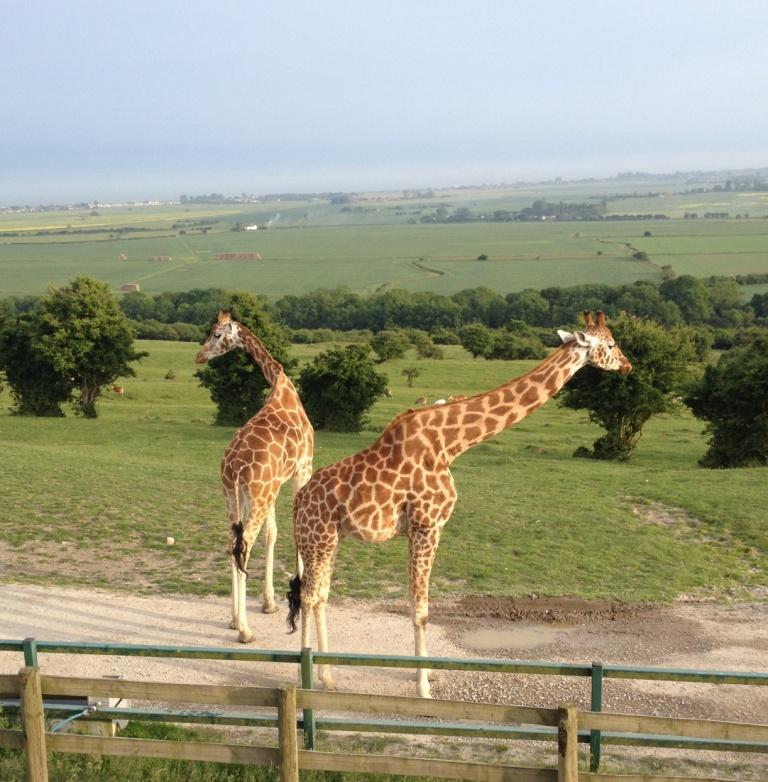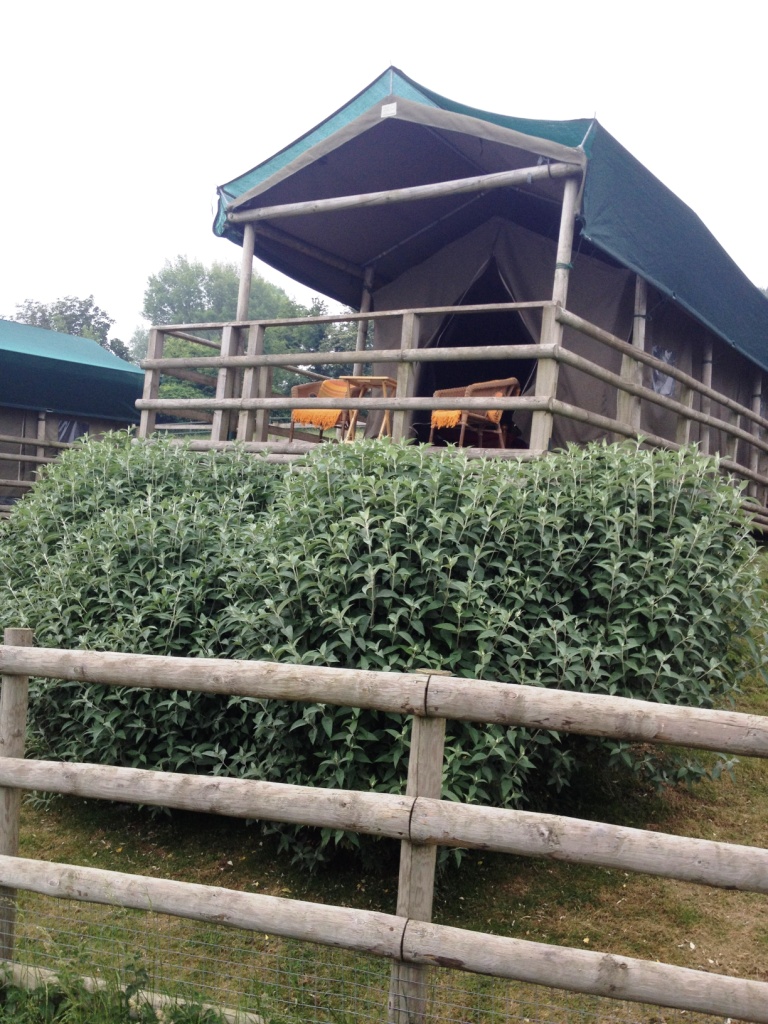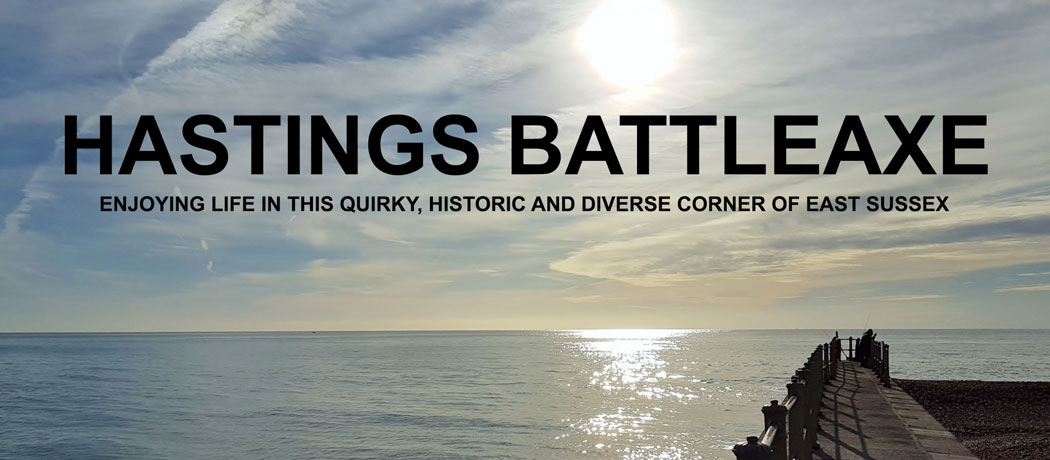Just back from an overnight stay at Livingstone Lodge, the top-rated ‘Safari’ experience at Port Lympne (or Limm, as us locals must learn to call it) Wildlife Park, near Hythe. Did we enjoy ourselves – yes, very much. Would we rate it as a peak experience – no. It was a joint birthday treat, and for me, a gesture towards the fateful Tanzania trek that never happened… but that’s another story.
We entered the park through a side electric gate, parked the car and checked in at a special Reception hut.
The other members of the party rolled up, 20 in all – two older couples and the rest very earnest young couples, armed with big cameras and binoculars. We met our rangers, led by a brawny South African guy who had done the real stuff in the Kruger Park, and all clambered aboard an authentic looking rusty old lorry for our African Experience Safari trek. Spent the next hour grinding slowly through the park in a haze of diesel fumes, with stops to photograph rhinos, an elephant eating its supper, various antelopes etc etc.The biggest stir of interest was caused by the appearance of several foxes – the only authentically wild animals we saw.
 |
| Giraffes come to call |
Eventually, the lorry dropped us at the Livingstone Lodge camp, a line of posh tents with wooden verandahs, a loo block and what they called the ‘laapa’ – a reed-roofed restaurant/bar, all inside a fenced compound in the middle of the African park. The tents are on a ridge, with a fantastic view down across the expanse of the park, over Romney Marsh to the sea. The tents also overlook the waterhole, with only a fence and a metal railing separating us from the animals.
 |
| Our tent |
We got a beer from the laapa and settled on our verandah in the early evening sun to survey the scene. It was lovely. We could see a little herd of wildebeest standing in the lush grass, swishing their tails, a few giraffes cropping the trees in the distance, some zebras dozing under the trees, two rhinos and various antelopes comfortably grazing, an ostrich nibbling at the grass. It was all very peaceful, but, the longer we looked – too peaceful. As one watched the animals, it was easy to remember that they had been born in captivity. They had no worries about finding food, no injury or disease, no fear of predators, and presumably, no fear of us.
After a bit the giraffes strolled up to the tents, looking half-heartedly hopeful. Maybe once someone had managed to slip them a tasty Pringle, but of course to do such a thing would be condemned as a major crime.
 Then, along came the rhinos, huffing at us officiously, like a pair of slightly camp old schoolmasters inspecting the dormitories. They have a surprisingly delicate, mincing walk. It was nice to see the creatures hanging out so close to us, but were they wild, exotic and exciting – I don’t think so. It was more like watching cows and sheep. The giraffes were in fact a band of neutered males – presumably kept solely to add authenticity to the environment.
Then, along came the rhinos, huffing at us officiously, like a pair of slightly camp old schoolmasters inspecting the dormitories. They have a surprisingly delicate, mincing walk. It was nice to see the creatures hanging out so close to us, but were they wild, exotic and exciting – I don’t think so. It was more like watching cows and sheep. The giraffes were in fact a band of neutered males – presumably kept solely to add authenticity to the environment.
Later, at dinner, which was, by the way, enormous and delicious, I asked the ex-Kruger ranger whether the wildebeest had any urge to migrate like they do on David Attenborough programmes. You know, where they surge across the plain and swim across a huge fast-flowing river and get eaten by waiting crocodiles. The bloke said not – they only migrate to get food.
Our fellow guests were very earnest about the animals – one woman said to the Philosopher that it was a
 |
| Wildebeest at the water hole |
‘privilege’ to see them. Sure, it is good that they are not kept in little cages, but a privilege? Am not sure of that. They are living in what must be animal heaven, and we were all paying an arm and a leg to look at them.
Talking of animal heaven, another thing that puzzles me is the current practice of breeding the creatures over here and then returning them to their natural environment, only for them to starve, get eaten, shot by poachers or whatever. Philosopher and I imagined them all claiming asylum at the Ecuadoran Embassy to avoid getting extradited to some diasagreeable place where their animal rights would not be respected. ‘We’re not African, we’re British’, they would cry, ‘We were born here’.
We didn’t sleep much, although the beds were very comfortable. The tent flapped, as tents tend to, in the
breeze. We had eaten far too much, some wildebeest thing was grunting and belching outside, and at dawn loads of ducks, seagulls and crows descended on the waterhole, quacking, shrieking and cawing. We were supposed to get up early to see the animals come to drink, but by the time we lurched blearily out they had been and gone.
 Had a good breakfast in the laapa, during which a ranger came and threw a load of pellets down, which brought all the animals rushing up to the railing. We then gathered up our things and piled back into the lorry again, to drive round some more bits of the park.
Had a good breakfast in the laapa, during which a ranger came and threw a load of pellets down, which brought all the animals rushing up to the railing. We then gathered up our things and piled back into the lorry again, to drive round some more bits of the park.
After we were deposited back at Reception, we strolled round looking at things we had missed. I always like lions and tigers, and gorillas. However, they had such big enclosures that you couldn’t see a living thing apart from greenery. Also, by this time, it was drizzling. I said ‘Where are all the kitties?’ to a keeper who was doing something with the smaller cats. She looked at me askance. ‘Well,’ she said, ‘you can’t expect them to come out in this weather.’ Well, actually I can…. Talk about a dependency culture, surely they ought to earn their keep a bit?
We did see a couple of gorillas, briefly, and then came across one silverback chap sitting looking out at us
through a glass window, deep in thought, one finger in his ear like a hairy folk music lover. He examined us with all-too-human eyes. I found myself apologising to him for taking his picture.
 |
| Deep in thought? |
I suppose our generation were spoilt when it came to encounters with exotic animals. We grew up in the days of elephant rides and chimps tea parties. I can still remember the feel of the bristly skin of the elephant at Dublin Zoo, and the surprising strength of her trunk. She was called Sara. My sister fed her a lettuce leaf – she got it stuck up her trunk and then blew it out in a rain storm of elephantine snot.
Was it cruel and undignified for the animals then? Personally, I don’t think so, provided they were treated with kindness and looked after properly. It was their job. Working is supposed to be good for us and to enhance our human dignity, we encourage dogs and horses to have an occupation, so why not the same for these animals?
So, finally, here I am, posing with the chimps back in those less enlightened days.
 |
| At Dublin Zoo in the 1950s |

Comments from Google+